BALANCE OF BODY AND MIND
February 25, 2013 by admin
Filed under An Introduction to Ayurveda
Ayurveda is a science of life based on the Vedas, the Hindu books of knowledge and wisdom. Ayurveda was introduced for about five thousand years old. Ayurveda is perhaps the most complete system of living, embracing not only medicine, but also philosophy, psychology, lifestyle and health.
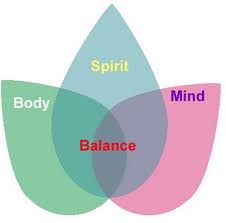 Ayurveda is based on the idea that the universe is composed of five basic elements of nature :Ether(space) , Air, Fire, Water and Earth, known as the Panchamahabhutas. The panchamabhutas combine to form the three vital energies, the doshas known as Vatta, Pitta, and Kapha. The mix of the three doshas in each of us, an inherited trait, determines our physical constitution called prakriti.
Ayurveda is based on the idea that the universe is composed of five basic elements of nature :Ether(space) , Air, Fire, Water and Earth, known as the Panchamahabhutas. The panchamabhutas combine to form the three vital energies, the doshas known as Vatta, Pitta, and Kapha. The mix of the three doshas in each of us, an inherited trait, determines our physical constitution called prakriti.
- Vata, pertaining to air and ether elements, is responsible for physical and mental movement, circulation, respiration and elimination.
- Pitta, pertaining to fire and water elements, is responsible for physical and mental digestion and metabolism.
- Kapha, pertaining to earth and water elements, is responsible for tissue growth and regeneration, physical and mental lubrication, structure, growth, immunity, stability and protection.
Each Dosha has an effect on the other. While one personality may reflect the prominence of one Dosha rather than another, the ideal for a balanced mind body state is where all three are working harmoniously together in a state of dynamic equilibrium
Methodology adopted in Ayurveda
Ayurveda is a holistic system of medicine that aims to balance the body, mind and spirit for optimum performance of a person and prevention and treatment of disease. Several problems such as headaches, hair loss and weight gain can be cured with this system of medicine. To achieve balance of mind and body, ayurveda recommends a proper diet, exercise and seasonal activities.
Follow Ayurvedic Diet
To do this you will have to establish your dosha typethat depends on your mind and body type. This can guide you on the foods that you should consume and the foods that you should avoid. Following an ayurvedic diet usually does not cost more than you would normally spend on groceries. It is a practical solution which requires discipline .
Practice Yoga
Regular practice of yoga along with a nutritious ayurvedic diet will do wonders for you. You will surely notice improvement in your awareness, physical health, mental stability and your ability to deal with stress. Yoga is considered good for spiritual growth as well. You can take the assistance of your instructor for determining selection of asanas.
Meditate for Balance
Ayurveda encourages meditation as it has several benefits. It clears your mind and improves your awareness. In addition it also improves your self-knowledge; an important factor that leads to a healthier mind and body, greater intelligence and stronger intuition.
Meditation can be classified into two types: daily and awareness meditation.
- Daily mediation: Meditation is done at a specific time daily for relaxation and spiritual growth.
- Awareness meditation: you are supposed to practice the simple art of being in the moment and it is practiced constantly in every activity that you do.
You will have to find the specific type of meditation that works for you. You can learn meditation by joining classes, reading books, CD’s or videos.
Mind Body Harmony
According to Ayurvedic principles, just as every individual has a unique fingerprint, the energy pattern of every individual varies from one another.
Ayurveda helps in bringing about balance of body, mind and consciousness, depending on individual constitution, by incorporating necessary lifestyle changes to maintain this balance.
The factors that disturb the balance of an individual could be external or internal. This would reflect by way of change in one’s constitution from their balanced state. These factors include physical and emotional stress, diet, weather change, work, family relationships and physical trauma.
Ayurveda lays emphasis on prevention and promotes maintenance of health by adopting healthy lifestyle habits.
As it is rightly said….He who has health…….. has everything.
Let’s make Ayurveda a lifestyle… enjoy a balanced life!!
Buy AYURVEDA AND THE MIND : THE HEALING OF CONSCIOUSNESS New ed Edition from Flipkart.com
IS HERNIA CURABLE WITH AYURVEDIC MEDICINE?
February 4, 2013 by admin
Filed under Tips for Ayurveda
Yes, Hernia can be cured with Ayurvedic medicine. You need to follow the instructions of the Vaidyar mainly on dietary restrictions and exercises to be followed to prevent recurrence. Let us understand about hernia…
What is hernia?
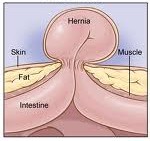 The term hernia means displacement of the internal organ or protrusion or herniation of the viscera. The internal part of stomach pops outward, forming an abnormal swelling. When our stomach muscles get weak, some portions of the intestine swell up by pushing the weak stomach muscle.
The term hernia means displacement of the internal organ or protrusion or herniation of the viscera. The internal part of stomach pops outward, forming an abnormal swelling. When our stomach muscles get weak, some portions of the intestine swell up by pushing the weak stomach muscle.
A hernia may develop in almost any part of the body; however, hernia is most commonly affected in the muscles of the abdominal wall. Hernia affects both genders.
Few individuals observe the protrusion at a young age and will live with it for years. But for few people the hernia is very painful and reduce general mobility. At times the complications increase thereby going in for surgery. Hernias also is hereditary, and can be caused by such things as coughing, straining during elimination, lifting heavy objects, accumulation of fluid in the abdominal cavity, and obesity.
Symptoms of Hernia
Symptoms of hernias vary, depending on the cause and the structures involved. Most begin as small, hardly noticeable breakthroughs. At first, they may be soft lumps under the skin, a little larger than a marble; there usually is no pain. Gradually, the pressure of the internal contents against the weak wall increases, and the size of the lump increases.
In the beginning stages , the hernia may be reducible – the protruding structures can be pushed back gently into their normal places. If those structures, however, cannot be returned to their normal locations through manipulation, the hernia is said to be irreducible, or incarcerated (confined).
Types of hernia:
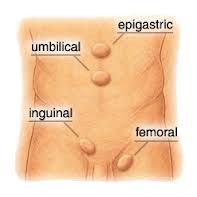 Abdominal wall hernia: Also known as an epigastric or ventral hernia. Common type of hernia among those confirmed.
Abdominal wall hernia: Also known as an epigastric or ventral hernia. Common type of hernia among those confirmed.
Indirect inguinal hernia: Affects men only. A loop of intestine passes down the canal from where a testis descends early in childhood into the scrotum. If neglected, this type of hernia tends to increase progressively in size (a “sliding hernia”) causing the scrotum to expand grossly.
Direct inguinal hernia: The intestinal loop forms a swelling in the inner part of the fold of the groin.
Femoral hernia: Mostly observed in women. An intestinal loop passes down the canal containing the major blood vessels to and from the leg, between the abdomen and the thigh, causing a bulge in the groin and another at the top of the inner thigh.
Umbilical Hernia: An intestinal loop protrudes through a weakness in the abdominal wall at the navel (but remains beneath the skin).
Hiatal hernia: A loop of the stomach when particularly full protrudes upward through the small opening in the diaphragm through which the esophagus passes, thus leaving the abdominal cavity and entering the chest.
Incisional hernia: Hernia that occurs at the site of a surgical incision. Occurs mainly due to strain on the healing tissues due to excessive muscular effort, lifting, coughing, or extreme pressure.
Ayurvedic diet recommended:
- Do not eat too much. Reduce the quantity taken at each meal.
- Eat slowly. Taking frequent small meals instead of three large meals are advised.
- Increase your intake of liquids, but avoid fizzy drinks.
- Taking water with meals, except half an hour before or one hour after a meal is recommended. This helps digestive system to function properly and reduce occurrence of heartburn. It also increases the overall weight in the stomach and slows down the digestive process by diluting the digestive juices.
- Do not eat raw food and avoid over-processed food items like white bread and sugar, cakes and biscuits, rice puddings and overcooked vegetables
- Drinking raw juices extracted from fresh fruits and vegetables, half an hour before each meal, is considered helpful.
- Consume diets consisting of seeds, nuts, whole cereal grains, vegetables and fruits, etc
- Prioritize on having fresh , lightly cooked vegetables and sprouted seeds.
- Carrot juice is considered especially beneficial, as it is rich in vitamin A and calcium and has a restorative effect
- Do not sleep immediately after a heavy meal.
- Take a walk after meals. At least walking 100 steps is advised.
Can a person confirmed with hernia perform exercises?
Yes , a person confirmed for the presence of hernia can perform exercises. Most intense exercises which jerk or put pressure on the muscles are not favorable for hernia. Yoga is the ideal hernia exercise system as it is gentle and gradually stretches the muscles.
Hernia exercises done with acute awareness in harmony with breath and hand support for the affected muscle strengthens the area with improved blood circulation and oxygenation. Yoga provides natural long term relief for hernia by preventing recurrence.
Treatment of Hernia
For small, non-strangulated and non-incarcerated hernias, various supports and trusses may offer temporary, symptomatic relief. However, the best treatment is herniorrhaphy (surgical closure or repair of the muscle wall through which the hernia protrudes).
When the weakened area is very large, some strong synthetic material may be sewn over the defect to reinforce the weak area. Post-operative care involves protecting the patient from respiratory infections that might cause coughing or sneezing, which would strain the suture line. Recovery is usually quick and complete.
Note: In case person undergoes surgery then he should not lift weights, perform heavy tasks, avoid climbing heights, if possible stairs too for a few weeks.
There is a traditional Indian deep-massage techniques on Marma points on the neck to tone up the muscles and relieve the pressure on the hernia area. Based on the symptoms you need to visit the medical practitioner and decide about the remedial actions.
AYURVEDIC TIPS AND DIET FOR PSORIASIS
January 31, 2013 by admin
Filed under Tips for Ayurveda
 Ayurveda believes that impurities in the blood associated with emotional factors are the cause of the disease. According to Ayurveda Psoriasis can be considered as the vitiation of Vata and Kapha.
Ayurveda believes that impurities in the blood associated with emotional factors are the cause of the disease. According to Ayurveda Psoriasis can be considered as the vitiation of Vata and Kapha.
Ayurvedic treatment for Psoriasis
Ayurveda suggests Panchakarma for the treatment of psoriasis. This is because detoxification of the body is very essential for the treatment of psoriasis. Both systemic and topical treatments are used in the treatment.
Ayurvedic Diet
Psoriasis patient is also given a strict diet regime called pathyam or parhes (dietary restrictions)
- Drinking fresh bitter gourd juice mixed with one teaspoon of lime juice on an empty stomach is an effective psoriasis treatment
- Non vegetarian diet is strongly prohibited. Sea food and red meat are not recommended.
- Avoid consuming opposite foods.
- Take care not to consume foods which cause indigestion.
- Do not eat too much salty, sour or acidic foods. Say no to radishes, urad dal, sesame, curds, fish and other sour foods.
- Avoid consumption of Alcohol and Quit Smoking.
- Avoid taking spicy food and consume only easily digestible food.
- Include more fruits, vegetable, fruit juices in your diet. Bitter gourd, curd, boiled vegetables, pumpkin etc… are good psoriasis diet.
- Avoid animal fats, eggs, processed canned foods from your diet.
Ayurvedic Tips for Psoriasis
- Do not control natural urges like vomiting, urination, bowel emptying, etc.
- Exposing to mild sunlight daily for 20 to 30 minutes will improve the texture of the affected area of the skin.
- Avoid consumption of Alcohol and Smoking. It aggravates psoriasis.
- Avoid sleeping in afternoons.
- Avoid using soap while taking bath instead use gram flour ( besan) and use a herbal scrubber.
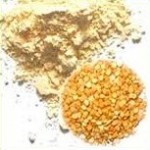
- After washing, pat the skin dry, don’t irritate it by rubbing vigorously.
- Apply moisturizing creams liberally on affected areas after bathing.
- Apply moisturizing gel or cream at regular intervals to maintain the moisture level of the skin.
- Smear on herbal balm which is infused with vata and kapha balancing herbs.
- Avoid all factors which trigger psoriasis. Reduce stress levels through meditation and yoga.
- Avoid pricking, peeling and scratching skin.
- Opt for cotton clothes over synthetic ones.
- Use separate, clean clothes and towel for your use.
- Do not take a cold water bath immediately after a heavy work out, travelling, a long walk, etc.
- Application of avocado oil gently on the effected part is found to be an effective treatment.
- Cod liver oil, lecithin, linseed oil, vitamin E, and zinc fasten the healing Process.
- Taking bath in sea water is found to be very effective in psoriasis treatment.
- Application of coconut oil, olive oil on the affected areas are extremely relieving. It moisturizes skin.
- Applying aloe vera cream thinly to irritated skin and rubbing lightly is effective. Take gel directly from fresh cut stem and apply.
- Place a cup of chopped cabbage in a bowl containing hot boiled water. When the water has cooled in the external container, take the cabbage and place it on the infected areas. Press with a soft towel. Minimizes itching and soothes affected areas.
- Mental health is absolutely necessary for an effective treatment of psoriasis. Try deep breathing and relaxation exercise to reduce stress.
Exercise Regularly. Be positive. Activate your energy levels. Keep yourself engrossed by reading to avoid thinking and increasing worries.
IMPORTANCE OF SIX TASTES IN AYURVEDIC DIET
September 17, 2012 by admin
Filed under Featured, Tips for Ayurveda
Ayurvedic diet doesn’t mean eating only legumes, rice and vegetables. Know your dosha type ( Vata, Pitta and Kapha) and balance the food intake by making right choices and decisions.
Ayurveda recognizes six tastes and it’s quite important to have all of these 6 tastes in your diet every day. The six tastes are:
- Sweet – sugar, honey, rice, pasta (made from the dough of wheat rava/semolina), milk, etc.
- Sour – lemons, hard cheese, yogurt(curd), vinegar, etc.
- Salty – salt, any salty food
- Pungent – chili peppers, red chilli , ginger, any hot spice
- Bitter – leafy greens, turmeric, lettuce (salad leaves),bitter gourd etc.
- Astringent – pomegranate, beans, lentils (dhals), etc.
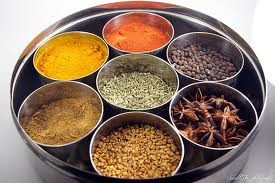 These six tastes are listed in the order they are digested in your body.
These six tastes are listed in the order they are digested in your body.
The pattern in Indian meals is that we start the course with starters, salads, main course and then dessert / sweet dish or fruit. Common observation is that in Indian meals we have a reverse pattern – salad is taken in the beginning and sweet dish at the end of the meal. Ayurveda Diet has a very holistic-medicine-point of view on diet.
Including all six tastes in your diet contributes to feeling satisfied at the end of a meal. Cravings are often caused by not having all of the six tastes in your daily diet. Many people often omit the bitter and astringent tastes (don’t be one of them!). When you have something bitter or astringent at the end of a meal, it actually reduces your desire for sweets.
Including all six tastes is a great way to incorporate Ayurvedic diet into your lifestyle and at the same time improve your health (not to mention a great way to shed off some pounds-effortlessly).
“You are what you eat” is a saying that you have probably heard before. It holds true not only on the physical but also on the psychological level.
Ayurveda recommends that food should be taken fresh (without pesticides, additives and other chemicals), seasonal, and as often as possible local. Fresh doesn’t, however, mean raw. The best are freshly cooked, whole meals.
You can make a good start when you know what is healthy food . Cook more with fresh produce and start playing with some basic Ayurvedic spices, such as turmeric, ginger, cumin and coriander. No matter what you cook, you can almost always add these spices to your dish. Not only are those excellent flavor and digestion enhancers, but they also have many medicinal properties.
Some right choices you can make while eating out: drink warm water instead of cold water, it enhances digestion. Similarly it is better to have a warm soup than going for ice cold salad during start uo of a meal course.
Eat only when you are hungry, but when you are not don’t eat. Although this seems over simplistic, this practice is the key to conquering most cases of obesity.
Eat light meals , include ginger tea – two times a day and stay healthy!!







